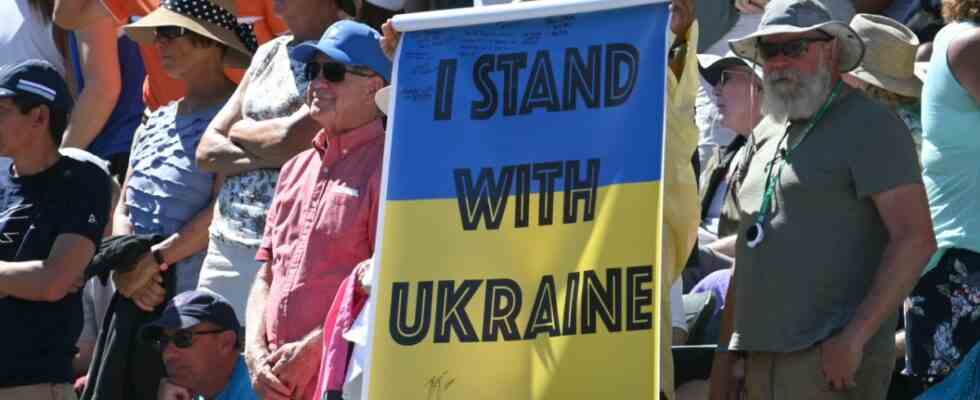The impressions conveyed testified to a carefree event. A photo of a glitteringly decorated ballroom where the gala dinner took place circulated on social media. The Hungarian Marton Fucsovics raved about a visit to the local art museum, some of the participating players posed for the group picture with their legs bare in a cocktail dress. Elsewhere, this is also documented, a German rejoiced: Alexander Zverev trilled that he was happy to finally be back on the pitch after his foot injury.
Zverev was certainly happy about the positive headlines that announced that his comeback had been successful. Although he had only won two longer tie-breaks against the Austrian Dominic Thiem (after that he lost to the Russian Daniil Medvedev in the normal game format 0: 6, 4: 6), but so be it. In principle, his return is to be welcomed.
Alexander Zverev is back on the tennis court after his injury – but like many top players, he also competes in countries that are not necessarily known for respecting human rights.
(Photo: Alexander Scheuber/Getty)
Tennis is alive, tennis works, even in the staden off-season, you might think, if there weren’t a few snags. Noble and exuberant dining was recently held at a team competition in Saint Petersburg, wrapped in the innocent tournament title North Palmyra Trophies. Zverev, in turn, competed in Saudi Arabia, at the Diriyah Cup, which sounds pore-deep clean and is known to be part of a sports washing program. The Australian Nick Kyrgios at least said openly why he competed there: because of the money. He even let the Davis Cup go, although Patriot, taking a six-figure sum for displayed efforts was more comfortable for him.
And the men’s professional series ATP? She now staged leadership by slapping a million dollar fine on the British tennis association LTA – because the LTA had excluded Russian and Belarusian professionals from tournaments in Great Britain this year because of Russia’s war of aggression against Ukraine. All of these developments can be regarded as at least remarkable; it was not so long ago that the sweet song of morality was sung. “Peace” is what some professionals wrote on the TV camera pane with a felt pen; A blue and yellow flag was often posted online next to the proper or sponsor’s name as a sign of solidarity. Posture, after all – it lasted for a summer.
Who doesn’t remember those days when the feeling spread: Aren’t we all a little bit Ukraine? And weren’t we also Peng Shuai? The case of the Chinese woman, who had been missing for so long and reappeared under dubious circumstances, had taken over the industry for a while, the WTA women’s tour felt encouraged to suspend tournaments in China, which rightly made WTA boss Steve Simon appear as a man with backbone. According to reports, another country should now sense a chance at one or the other event: Saudi Arabia. The world is complicated. Rarely complicated.
When it comes to complex issues like Saudi Arabia, there is silence
You have to be able to afford it, which is why differentiation is all the more important. The fact that a country like Saudi Arabia is opening up to sport is not to be condemned per se, on the contrary. It would just be nice if human rights were polished there and promoted with hundreds of hashtags like the Diriyah Cup, which by the way is organized by an Austrian living in Switzerland who has held the ATP tournament in Hamburg in recent years. On the one hand, Zverev is promoting his new diabetes foundation, which is a good thing. But if you write to your management about complex issues like Saudi Arabia, there is silence. You also have to be willing to afford an attitude, luckily everyone is free to do so, at least if you don’t come from countries like Saudi Arabia.
Not a new finding either: many are morally flexible, although it is not easy to outperform Thomas Bach in this discipline. Little by little, the IOC President is working to reintegrate the Russian sports world into the Olympic community; sometimes a rhetorical door opened here, sometimes there. Bach opened the gate wide on Friday. At the Olympic Summit – a round without the right to decide – he does integration work in the Russian sense; he paraphrases it: “We are investigating ways to enable their participation.” The fact that Stanislav Pozdnyakov, the head of Russia’s Olympic Committee, was invited as a guest fitted into the picture of some sports-political trends that are not only evident in tennis. Money, power and morality wrestle with each other, in the end it’s probably like in love: three are one too many – and you can guess what’s going to fall by the wayside.

